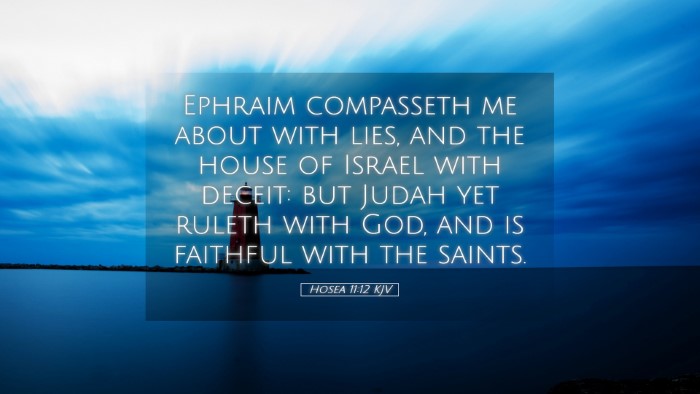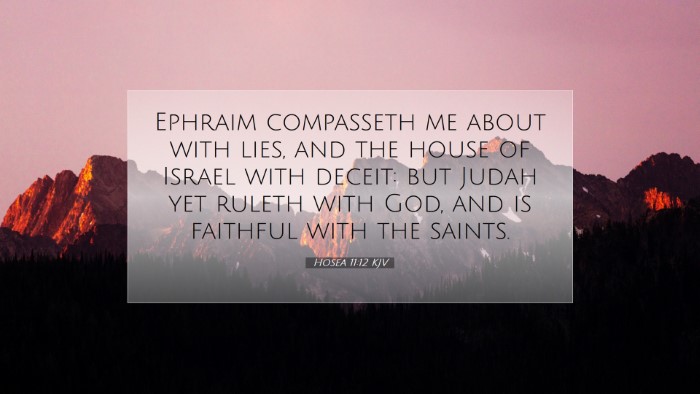Old Testament
Genesis Exodus Leviticus Numbers Deuteronomy Joshua Judges Ruth 1 Samuel 2 Samuel 1 Kings 2 Kings 1 Chronicles 2 Chronicles Ezra Nehemiah Esther Job Psalms Proverbs Ecclesiastes Song of Solomon Isaiah Jeremiah Lamentations Ezekiel Daniel Hosea Joel Amos Obadiah Jonah Micah Nahum Habakkuk Zephaniah Haggai Zechariah MalachiHosea 11:12
Hosea 11:12 KJV
Ephraim compasseth me about with lies, and the house of Israel with deceit: but Judah yet ruleth with God, and is faithful with the saints.
Hosea 11:12 Bible Commentary
Commentary on Hosea 11:12
Hosea 11:12: "Ephraim compasseth me about with lies, and the house of Israel with deceit: but Judah yet ruleth with God, and is faithful with the saints." This verse encapsulates the spiritual state of Israel, highlighting themes of deceit, relationship with God, and contrasting the houses of Israel and Judah.
Contextual Analysis
In the book of Hosea, the prophet speaks to a divided Israel, marked by sin and rebellion against God. Hosea’s message addresses both Israel and Judah, focusing particularly on the unfaithfulness of the northern kingdom (Ephraim) and the implications of their actions.
Historical Background
Matthew Henry notes that during Hosea's time, Israel was entrenched in idolatry and falsehoods, with their leaders often practicing deception. The term "compasseth" indicates that Israel's lies encircle God, suggesting a pervasive and inescapable presence of untruth that grieves the Lord.
Spiritual Significance
Hosea’s reference to "lies" and "deceit" serves as a stark reminder of the consequences of turning away from the truth of God. Albert Barnes elaborates that this condition reflects a nation steeped in hypocrisy, where outward appearances do not align with their inner spiritual realities. The lack of integrity among the people indicates a deeper separation from God’s covenant.
Interpretive Insights
- The Character of God: The phrase "compasseth me about with lies" portrays the Lord as a wounded party amidst deceitful actions, emphasizing His enduring love for His people despite their betrayal.
- The Nature of Deception: Adam Clarke explains that falsehood in Israel correlates with their idolatrous practices, where the worship of false gods leads to industrial and ethical decline, presenting a direct affront to God’s holiness.
- Contrast with Judah: The mention of "Judah yet ruleth with God" serves to contrast the faithfulness of Judah with the treachery of Ephraim. This image speaks to God's ongoing relationship with the remnant who strive to maintain their covenant loyalty.
Theological Implications
The verse clearly expresses the gravity of spiritual unfaithfulness and the enduring hope found in a remnant community. The theological undertones suggest a God who desires truth and integrity from His people, and while He rebukes, He also extols those who remain faithful.
Call to Repentance
The broader message of Hosea serves as a clarion call for repentance. Matthew Henry points out that sincere repentance leads to restorative communion with God, contrasting sharply with the deceptive practices of Israel which severed their relationship with Him.
The Role of Faithfulness
Faithfulness to God is not merely an external practice but a deep-seated condition of the heart, as alluded to in the text. Albert Barnes highlights that faithfulness implies an active engagement with God’s commands and a willingness to live out the covenant through righteous actions.
Application for Today's Believers
The relevance of Hosea 11:12 extends beyond its historical context, speaking directly to modern believers. There are practical lessons that pastors, theologians, and laypeople can glean from this passage:
- Integrity in Worship: Believers are called to examine their own lives for areas of deceit and to seek authentic worship that is reflective of their relationship with God.
- Community Accountability: The contrast between Israel and Judah invites communities of faith to hold one another accountable to the truth of the Gospel and to support one another in faithfulness.
- Hope in Repentance: Just as Hosea offered a path to restoration, today's church must be a beacon of hope, emphasizing that repentance leads to reconciliation with God.
Conclusion
Hosea 11:12 invites deep reflection on the nature of deception and faithfulness. The interplay between Israel's lies and Judah's fidelity paints a rich theological tapestry that reveals God's desire for honesty and integrity among His people. As believers strive to embody the principles laid out in this verse, they are reminded of the redemptive nature of God, who calls His people back to Himself through grace and truth.


